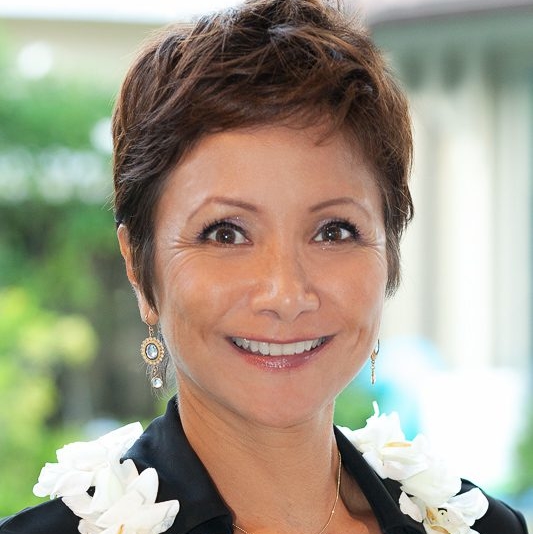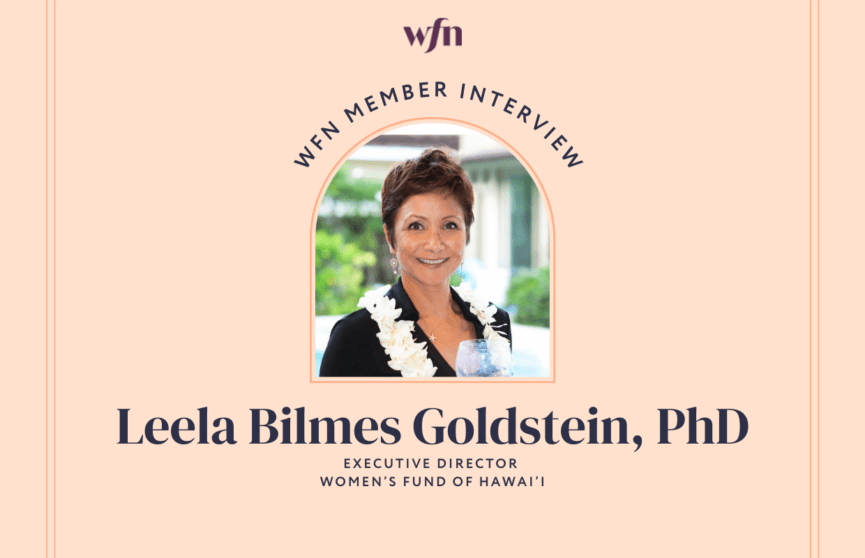WFN Board member, Leela Bilmes Goldstein, Executive Director of Women’s Fund of Hawai‘i (WFH)’s newest report, Pathways in the Pandemic: Intersectional Impacts of COVID-19 in Hawai‘i, has some stark findings:
- Pacific Islander and Filipinx communities are disproportionately impacted by COVID-19: The mortality rate for Hawai‘i’s Pacific Islanders is the highest in the U.S. (319.6 deaths per 100,000).
- Zero CARES Act funding was earmarked for programs aimed at women specifically or to Native Hawaiian, Filipinx, or Pacific Islander women.
- Data on trans*, nonbinary, or non-conforming people was non-existent, demonstrating limits to understanding how all communities were affected.
The report also makes the case for a care-led recovery. Collective action and grassroots organizing led by workers and women’s organizations played key roles in mitigating the gendered impacts of the pandemic.
We know that place-based, data-informed solutions are key to addressing our communities’ most pressing problems. Learn more about Leela, WFH’s findings, and how you might be able to apply some of their learnings in your work by reading the full interview below.
Elizabeth Barajas-Román: Leela, it’s so great to get to speak with you in the new year. Tell us about yourself and your organization.
Leela Bilmes Goldstein: Women’s Fund of Hawai‘i (WFH) is a small non-profit organization and proud member of the Women’s Funding Network. WFH began as a fund at the Hawai‘i Community Foundation in 1989 and became its own 501(c)3 in 2004. It has been supporting innovative, grassroots programs that empower women and girls statewide since its early days at the Community Foundation up through the present. WFH increases visibility for its grant partners, creates community opportunities for learning and discovery, and provides research on the status of women in Hawai‘i.
Most recently we published a report on the gendered impact of COVID-19 in our state.
EBR: Why did WFH create this report? What was the need?
LBG: The COVID-19 pandemic saw a disproportionate effect on Hawai’i’s women, particularly when considering the varied layers of our many identities. The pursuit of a “tourism-led” recovery excluded many working class women of color. Despite women making up two thirds of frontline workers, there were significant job losses in feminized sectors of the economy considered “essential services,” particularly healthcare, child care, and social assistance.
While Hawai‘i’ remained an accessible place for tourists and wealthy elites to find solace from COVID-19, shifts in relationships and access to ‘āina (land) due to stay-at-home orders had a profound impact on native populations. Some places were available for a brief restoration/reclamation with the absence of tourists while other community spaces like lo‘i (water taro patch) or fishponds were generally inaccessible due to gathering restrictions. This further contributed to the displacement and outmigration of Native Hawaiians and local families.
By March 2021, 4,800 child care seats were lost despite awarding $11.9m of CARES Act money to private providers (compared to $2.5m awarded to Head Start) while child care worker wages remain low at $12.43/hour. The privatization of this CARES Act funding is dangerous – our data found that zero CARES Act funding was earmarked for programs aimed at women specifically or to Native Hawaiian, Filipinx, or Pacific Islander women, in stark comparison to the to Honolulu Police Department being awarded 10% ($40m) of Honolulu County’s CARES Act money and hundreds of millions of dollars to the tourism/hospitality industry from the CARES Act and PPP loans.
Access to adequate child care, health care, and resources are decreasing at a time when we need them the most. The purpose of this report was to analyze the gendered impacts of the pandemic up to the current moment in order to help inform feminist advocacy, organizing, and policymaking processes in and beyond Hawai’i. Our hope is that by identifying gaps and opportunities, non-profits can focus their efforts on those areas where women most need support. We also hope to influence policy makers and legislators to take into account how Hawai‘i’s women have been—and continue to be—harmed by the ongoing pandemic; and to create policies that promote a gender equitable recovery.
What are some topline learnings you can share with us from your research?
Privatization of CARES Act money, the lack of affordable housing exacerbated by the pandemic, and a lack of care infrastructure left many women without much-needed support from the government or private sector. The philanthropic community stepped in to fill these much-needed gaps.
The pandemic impacted individuals in different ways depending on how they are positioned by race/ethnicity, gender, sexuality, disability, class status, and other factors. For example, the people who appear to be most negatively affected here in Hawai‘i are Pacific Islander, Filipinx, and Native Hawaiian females. Women in Hawai‘i had the highest unemployment rate in the nation from August 2020 through March 2021, with the Filipinx community experiencing the highest rates among all groups.
The mortality rate for Pacific Islanders (due to COVID) is higher in Hawai‘i than anywhere in the US. Vaccine access mirrored longstanding health inequities, with Pacific Islanders and Native Hawaiians having the lowest rates of vaccination. Also, unemployment hit women-intensive sectors of the economy hard—such as housekeeping in hotels—whose workforce is largely comprised of Filipinx and immigrant women.
Why is it important to approach philanthropy with an intersectional gender lens?
People and communities are multidimensional, and, as we’ve seen in our report, they will experience events differently depending upon how they are positioned in society. Philanthropy can be most impactful when we understand and take into account the multiple potential factors of people’s lives and experiences.
What can other cities, states, or countries take away from your report learnings?
Hawai’i has a different demographic profile from others. Asian women/people comprise the largest percentage of our population, 10% of our population is Hawaiian, and only about 2% is black. The pandemic has had disparate repercussions on different groups. In addition, we found data on trans*, nonbinary, or non-conforming people was non-existent, demonstrating limits to our understanding of how these communities were affected. It is crucial that data collection includes all the varied intersections of our identities. If we understand who has been most affected and how in other locations as well, we can tailor our response to support those communities most in need to ensure an equitable recovery.
There have also been bright spots and important accomplishments during the pandemic. Through Af3irm Hawai‘i, a sex trafficking relief fund was established. A neighbor island trans support group was created through Hawai‘i Health & Harm Reduction Center, who is one of WFH’s fall grant partners. In 2021, WFH made $195k in grant funding, our highest ever.
We need to collectively reimagine our economies and systems of care and pay workers—all of them—more. In addition, if we ensure our girls and children get at least a grade 12 education if not more, we can prepare our female and female identifying folks for the workforce of the future.
What do you envision for the future – and how can the philanthropic community support your work?
The gender justice movement has been slow to build momentum in Hawai‘i, even though we know that when women thrive, communities prosper. My hope is, with what we’re still seeing with the pandemic and its effects on women here in terms of violence, loss of income, health disparities, and more, folks will understand why WFH’s work is important and support us and our grant partners with more purpose than ever before. 2021 was a tough year, but here at Women’s Fund of Hawai’i we see reason to hope.
The pandemic demonstrated the bankruptcy of extractive relations, processes, and ways of living that perpetuate climate destruction, economic and social exploitation, and violence. A Care-Led Recovery would include expansion of social safety nets, including workers’ rights, investing in care infrastructure, provision of quality public services and healthcare, centering survivors and disability in public health considerations, a reckoning with Hawai‘i’s own history, and much more. A Care-Led Recovery re-imagines an economy that genuinely works for and cares for everyone.
Pathways in the Pandemic: Intersectional Impacts of COVID-19 in Hawai‘i
About Leela
Leela Bilmes Goldstein is Executive Director of Women’s Fund of Hawai‘i, a grant making foundation dedicated to supporting women and girls statewide. The Fund is devoted to the pursuit of gender and racial equity and equality in the islands. She also serves as a Trustee for Abilities Unlimited Hawai‘i and on the Board of Directors of Hawai‘i Friends for Restorative Justice and the Women’s Funding Network.
Leela was born in Bangkok, Thailand and grew up in Honolulu. She received three degrees from UC Berkeley, the most recent of which was a PhD in Linguistics. Prior to Women’s Fund of Hawai‘i, she worked in stewardship at Punahou School. Besides Hawai‘i and California, Leela has also attended university and worked in Thailand and France and is fluent in the languages of both countries.
Leela was honored to be named one of PBN’s 2018 Women Who Mean Business for her non-profit work and is passionate about social justice. She is the proud mom of two daughters. Recent unforgettable experiences include participating in the 2017 Women’s March in Washington, D.C., bringing civil rights activist Susan Burton to speak on O‘ahu, interviewing feminist author Roxane Gay onstage at the Hawai‘i Theatre, seeing the Na Pali Coast for the first time, and receiving a message of support for Women’s Fund of Hawai‘i from Oprah Winfrey.

